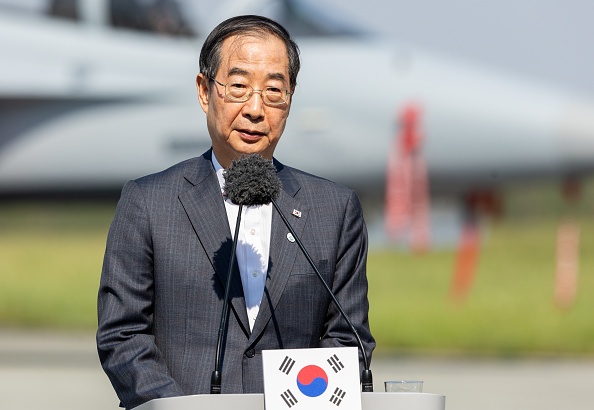Prime Minister Han Duck-soo, who was reinstated on Monday as South Korea’s acting president, is a technocrat whose experience and reputation as a safe pair of hands transcended party lines and helped him serve in senior posts under five presidents.
Known as a seasoned economic, trade and foreign affairs specialist, Han, 75, was serving the second stint as the head of cabinet, when he became acting president on December 14 after President Yoon Suk Yeol was impeached by parliament for leading a short-lived martial law.
Two weeks later, Han himself was impeached after being accused of aiding Yoon in the martial law declaration and his powers suspended. He denied this but accepted some responsibility for the ensuing crisis by failing to dissuade Yoon from making the surprise move.
On Monday, the Constitutional Court overturned his impeachment, restoring his powers to serve as leader while the country awaits the same court’s ruling on Yoon’s impeachment.
In a country sharply divided by partisan rhetoric, Han has been a rare example of an official who has sought to stay out of the political fray.
“It is my life’s honour that I have been able to serve the people with all my might,” Han said after parliament voted to impeach him.
Earlier, when he stepped into the acting presidency, he faced the challenge of keeping government functioning through its gravest political crisis in four decades, while also tackling threats from nuclear-armed neighbour North Korea, and a slowing economy at home.
It is the same daunting responsibility he returns to but with external pressure on the export-reliant economy much more intense under the threat of higher tariffs for its products to the United States under the second Donald Trump presidency.
Han has served in leadership positions for more than three decades under five presidents, both conservative and liberal.
His roles have ranged from prime minister, finance minister and trade minister to presidential secretary for policy co-ordination, besides being ambassador to the United States and the OECD and heading up think-tanks and organisations.
With a Harvard doctorate in economics, Han’s expertise in the economy, trade and diplomacy as well as a reputation for rationality, a moderate demeanour and hard work had made him a regular go-to man in South Korean politics.
Han has been prime minister since Yoon’s term began in 2022, his second time in the role after a stint under former president Roh Moo-hyun in 2007-2008.
“He has served in key posts in state affairs solely through recognition of his skills and expertise, unrelated to political factions,” Yoon said when appointing Han in 2022, echoing descriptions used when previous administrations tapped him.
Han has experience working with South Korea’s key ally the United States, having been deeply involved in the process of signing the U.S.-South Korea Free Trade Agreement.
Fluent in English, he was appointed South Korea’s ambassador to the United States in 2009, working in Washington at a time when former U.S. President Joe Biden was vice president, and contributed to Congress approving the free trade deal in 2011.
“He is a civil servant through and through, who didn’t take on a political colour despite working under (five presidents),” said a former high-ranking government official speaking on condition of anonymity.
Han’s acting presidency had been expected to last for months. Now the role is likely to be brief, until the Constitutional Court delivers its ruling on whether to remove Yoon or restore his powers. The ruling is expected within days.
If Yoon is removed, a presidential election must be held in 60 days. South Korea’s constitution does not say how much the acting president is empowered to do in the role.
(Reuters)














